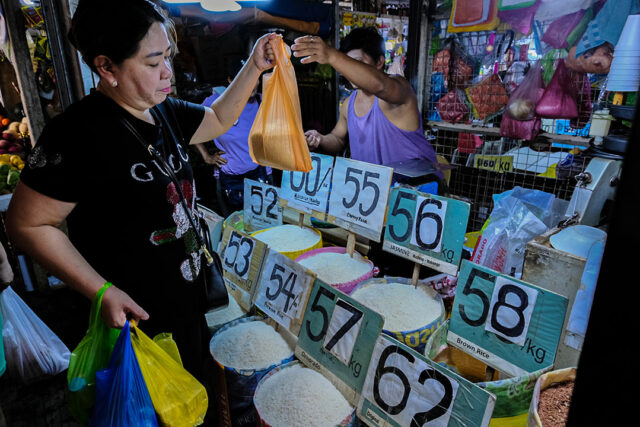By Luisa Maria Jacinta C. Jocson, Reporter
THE BANGKO SENTRAL ng Pilipinas (BSP) on Monday left its key rate unchanged at 6.5% for a fourth straight meeting and signaled a possible delay in rate cuts due to inflation risks.
The Monetary Board maintained its target reverse repurchase rate at a near 17-year high, as expected by 16 economists in a BusinessWorld poll last week.
Interest rates on the overnight deposit and lending facilities were also left unchanged at 6% and 7%.
This is the fourth straight meeting that the BSP stood pat since its 25-basis-point (bp) off-cycle hike in October.
“The latest inflation path has shifted slightly higher but remains within target… Given these considerations, the Monetary Board deems it appropriate to maintain the BSP’s tight monetary policy settings,” BSP Governor Eli M. Remolona, Jr. said at a press briefing on Monday.
He said upside risks to inflation have “become worse,” citing higher transport fares, elevated food prices, rising electricity and oil prices, and possible wage hikes.
“So that would make us somewhat more hawkish than before,” Mr. Remolona said. “If we were relatively dovish, we might reduce rates in the third quarter and that would be no more than 25 basis points (bps).”
“But now we’re feeling a bit more hawkish than before, so I would say we’re not going to do it by the third quarter, we may do it down the road.”
The BSP also raised its risk-adjusted inflation forecast this year to 4% from 3.9%. However, it kept its risk-adjusted forecast for 2025 at 3.5%.
The central bank likewise hiked its baseline inflation forecast to 3.8% for 2024 from 3.6% but maintained its 3.2% forecast for next year.
The BSP chief said it would make a case for rate cuts if inflation continues to ease and if economic growth is “not too strong.”
“If we see some good news, (within target) inflation and somewhat weak growth, we could ease by the third quarter. And then (if) it’s the opposite, we would ease by the first quarter of 2025,” he said.
“We would have to be somewhat surprised by a weak growth number for us to cut that sooner than the third quarter,” he added.
Mr. Remolona said elevated rice prices are a key risk to the outlook.
“If I were to name one single commodity, it would be rice and rice prices, they’re not only very significant at this time, they also are what we call salient prices. They get noticed, and they tend to affect expectations more,” he said.
Inflation accelerated for a second straight month to 3.7% in March from 3.4% in February. Rice inflation accelerated to 24.4% in March from 23.7% a month ago, the fastest since 24.6% in February 2009. Rice accounted for almost half of overall inflation for the month.
The BSP earlier said inflation could temporarily breach the 2-4% target over the next two quarters.
Mr. Remolona said policy makers are not considering any rate hikes. “We’re contemplating easing, we’re not contemplating any further tightening,” he said.
“I think the data will have to be really bad for us to consider a further rate hike because we’re already tight at the moment. This tightness, we think, is sufficient to bring inflation rates down,” he added.
Earlier rate hikes continue to affect the economy, Mr. Remolona said.
From May 2022 to October 2023, the Monetary Board raised borrowing costs by 450 bps to tame inflation.
“The previous rate increases continue to have an impact in terms of restraining demand. Our policy rates tend to have long lags in terms of transmission to the economy as well as to inflation,” he said.
“Last time we raised rates was October 2023, we had an off-cycle rate hike. That’s still having an effect today. So, at the moment, we’re still facing tight monetary conditions. We’re relying on those effects to continue to affect demand as well as inflation,” he added.
Mr. Remolona said that they expect the economy to grow by about 5.9% this year. This was slightly below the revised 6-7% growth target set by the Development Budget Coordination Committee (DBCC) for 2024.
The country’s gross domestic product (GDP) grew by a revised 5.5% in 2023.
MORE HAWKISH TONE
“The central bank in the Philippines today left its main policy rate unchanged, but sounded more hawkish than we had expected on inflation,” Capital Economics said in a commentary.
It said that it expects the BSP to cut interest rates in August instead of its earlier forecast of rate cuts by June.
ING Bank N.V. Manila Senior Economist Nicholas Antonio T. Mapa said the central bank might extend its rate pause until the second half of the year.
“The BSP previously indicated it was open to cutting policy rates in 2024. However, we believe the timing of such a reduction would require a Fed in easing mode and a more favorable domestic inflation landscape,” he said in an e-mailed note.
“With the Fed possibly pushing back the timing of its rate cuts to the second half of the year and Philippine inflation projected to breach the upper end of the BSP’s target in the near term, we believe the central bank will extend its hold until the Fed finally cuts its own policy rates and headline inflation cools,” he added.
Pantheon Chief Emerging Asia Economist Miguel Chanco said in an e-mailed note that he expects 100 bps of rate cuts before the end of the year.
“The first (cut is) still possible in June, in the event that first-quarter GDP disappoints considerably,” he said.
Inflation is expected to further accelerate in the coming months but will eventually return to target before the end of the year, analysts said.
Mr. Chanco said inflation could further quicken in April, possibly above the upper end of the 2-4% target range.
“But we reckon that this will be the peak, with food inflation likely to turn a corner, as base effects will turn progressively favorable until the end of the third quarter, starting in May,” he added.
Pantheon Macroeconomics raised its average inflation forecast to 3.4% this year from 3.2%.
Capital Economics also said inflation should settle within target in the second half due to “an increase in the supply of agricultural products, slower economic growth and more beneficial base effects.”












